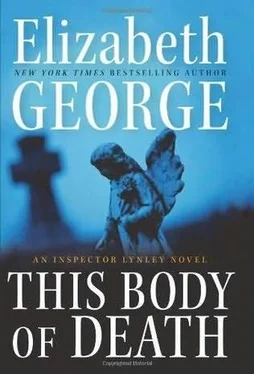The problem had two parts and the head of the press bureau shed light upon them without further prefatory remarks. The first part constituted unauthorised deal making. The second part constituted the result of that unauthorised deal making. Both were equally damaging to the Met.
“Damaging to the Met” had nothing to do with real damage, Isabelle quickly discovered. It did not mean the police had lost any power over the criminal element. Rather, damage to the Met meant damage to the image of the Met, and whenever the Met’s image was sullied, the sullying generally came from the press.
In this case, what the press were reporting appeared to have come verbatim from Zaynab Bourne. She had embraced the deal offered by Detective Superintendent Isabelle Ardery at St. Thomas’ Hospital: unfettered access to Yukio Matsumoto in exchange for the Met’s admission of culpability for the Japanese man’s flight and his subsequent injuries. The final edition of the Evening Standard was leading with the story, but unfortunately the Standard was leading with only half of it and that was the culpability half. “Met Admits Wrongdoing” was how the paper was phrasing it, and they were doing their phrasing in a three-inch banner below which were printed photos of the accident scene, photos of the solicitor at the press conference where she’d made this announcement, and a publicity shot of Hiro Matsumoto and his cello, as if he and not his brother were the victim of the accident in question.
Now that Scotland Yard had admitted its part in causing the terrible injuries from which Yukio Matsumoto was heroically trying to recover, Mrs. Bourne had said, she would be exploring the monetary compensation owed to him. They could all thank God that no armed officers had been involved in chasing the poor man, by the way. Had the police been wielding guns, she had little doubt that Mr. Matsumoto would now be awaiting burial.
Isabelle reckoned that the real reason she was sitting in Hillier’s office with the assistant commissioner and Stephenson Deacon had to do with the monetary compensation that Zaynab Bourne had mentioned. Feverishly, she went back over her conversation with the solicitor-held in the corridor outside of Yukio Matsumoto’s room-and she recognised an element of that conversation that Bourne had not taken into account prior to speaking to the press.
She said, “Mrs. Bourne is exaggerating, sir.” She spoke to Hillier. “We had a conversation about what led up to Mr. Matsumoto’s injuries, but that was the extent of it. I no more agreed to her assessment of the circumstances than I offered to slash my wrists in front of television cameras.” She winced inwardly as soon as she’d spoken. Bad choice of visual image, she thought. From the expression on the assistant commissioner’s face, she reckoned that he would have been only too happy had she slashed her wrists or any other part of her body, for that matter. She said, “The two of us talked alone as well,” and she hoped they’d fill in the blanks from there so that she would not have to do so: There were no witnesses to their conversation. It mattered little what Zaynab Bourne said. The Met could simply deny it.
Hillier looked at Deacon. Deacon raised an eyebrow. Deacon looked at Isabelle. Isabelle went on.
“Beyond that,” she said, “there’s the not inconsiderable matter of public safety to be looked at.”
“Explain.” Hillier was the one to speak. He glanced at the phone messages fanned out on the table. Isabelle assumed they were from Bourne, the media, and Hillier’s own superior officer.
“There were hundreds of people in Covent Garden when Mr. Matsumoto bolted,” Isabelle said. “It’s true we gave chase and Mrs. Bourne can certainly argue that we did so despite knowing the man is a paranoid schizophrenic. But we can counter that claim with the weightier claim that we gave chase for precisely that reason. We knew he was unstable, but we also knew he was involved in a murder. His own brother had identified him from the e-fit in the newspapers. Beyond that, we had hairs on the body that we knew were Oriental in origin and that, in conjunction with a description of this very man running from the scene of a violent murder, clothing disheveled…” She let the remainder of the sentence dangle for a moment. It seemed to her that the rest was implicit: What option had the police possessed other than to give chase? “We had no idea if he was armed,” she concluded. “He might very well have struck again.”
Hillier looked at Deacon another time. They communicated wordlessly. It was then that it came to Isabelle that something had already been decided between them, and she was in the room to hear that decision rather than to defend what had happened out in the street. Hillier finally spoke. “The press isn’t stupid, Isabelle. They’re fully capable of working on your time line and using it against you and, by extension, against the Met.”
“Sir?” She frowned.
Deacon leaned towards her. His voice was patient. “We try not to operate like our American cousins, my dear,” he said. “Shoot first and ask questions later? That’s not quite our style.”
At his patronising tone, she felt hairs rise on the back of her neck. “I don’t see how-”
“Then let me clarify,” Deacon interrupted. “When you gave chase, you had no idea the hairs from the body belonged to an Oriental, let alone to Mr. Matsumoto. You had less idea that he was indeed the person who’d been fleeing the crime scene.”
“That turned out to be-”
“Well, yes, it did. And isn’t that a relief. But the problem is the chase itself and your admission of culpability for it.”
“As I said, there were no witnesses to my conversation with-”
“And that’s what you would have me declare to the press? It’s our word against hers and so there? That’s actually the best response you have to offer?”
“Sir.” This she said to Hillier. “I had little choice in the matter at the hospital. We had Yukio Matsumoto conscious. We had his brother and his sister willing to let me talk to him. And we had him talking as well. We ended up with two e-fits, and if I hadn’t made a deal with the solicitor, we’d not have anything more than we had yesterday.”
“Ah, yes, the e-fits.” Deacon was the one to speak, and he opened the manila folder he’d brought with him. Isabelle saw he’d come to Hillier’s office armed: He’d already managed to get copies of the e-fits himself. He looked at them, then at her. He handed the e-fits over to Hillier. Hillier examined them. He took his time. He tapped the tips of his fingers together as he made his assessment of what Isabelle’s deal making with Zaynab Bourne had-and had not-gained them. He was no more a fool than she was herself, than Deacon was, than any of the investigating officers were. He drew his conclusion, but he didn’t speak it. He didn’t need to. Instead, he raised his eyes to her. Blue, soulless. Were they also regretful? And if they were, what did he regret?
“Two days to finish this up,” he told her. “After that, I believe we can assume that your time with us has come to an end.”
LYNLEY FOUND THE house without too much difficulty despite its being south of the river, where a single wrong turn could easily put one on the road to Brighton instead of, perhaps, the road to Kent or the road to Cambridgeshire. But in this case his clue to location was that, according to the A-Z, the street he wanted lay squarely between Wandsworth Prison and Wandsworth Cemetery. Insalubrious, his wife would have called it. Darling, the place has everything to recommend it to the suicidal or the permanently depressed.
Helen wouldn’t have been wrong, especially with regard to the structure in which Isabelle Ardery had established her digs. The house itself wasn’t entirely bad-despite the dying tree in front of it and the concrete pad that surrounded the dying tree and made it a dying tree in the first place-but Isabelle had taken the basement flat and, as the house faced north, the place was like a pit. It put Lynley immediately in mind of Welsh miners, and that was before he’d even got inside.
Читать дальше












